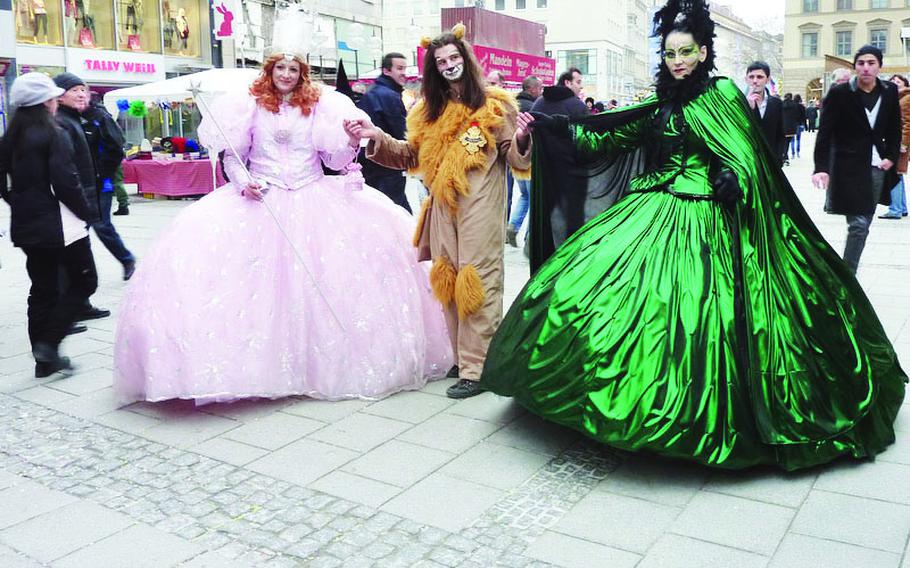
Visitors from the land of Oz? A pair of elegantly costumed Fasching revelers pose with a feline friend during last year's Carnival celebrations in Munich. (Michael Abrams/Stars and Stripes)
In Munich, Germany’s third-largest city, the pre-Lenten fun is known as Fasching.
It is, perhaps, not as boisterous as the big celebrations along the Rhine River, but Munich does know how to have fun. And the Bavarian capital features one of Carnival season’s unique traditions, the Dance of the Market Women.
The season here is made up mostly of fancy Fasching balls, and it is not until the final weekend, from the Sunday before Lent to Shrove Tuesday, that things really heat up.
On these days, Neuhauserstrasse and Kaufingerstrasse — Munich’s main pedestrian area — and the Viktualienmarkt are one big party zone.
Bands play on makeshift stages, everything from oom-pah-pah to rock ’n’ roll. Stands sell drinks and food to masked denizens dancing in the streets. The fare ranges from the traditional Munich Weisswurst (white sausage) to gourmet salmon. And while this is Bavaria, beer is not the only thing flowing. Sparkling wine is very popular, and so are rum-spiked Caipirinhas, giving the party — despite the cold — a Brazilian flavor.
The highlight of Munich Fasching is the Tanz der Marktfrauen — the Dance of the Market Women — on Shrove Tuesday.
Carnival season may be a time for masquerading and foolery, but the market women are for real. Any other time of year, you will see them selling their fruit and vegetables, flowers, cheese, bread or wine at the Viktualienmarkt, the city’s downtown food market.
The market square starts filling as early as 8 a.m. for the dance, and by the time the ladies take the stage at 11 a.m., the place is jam-packed.
For the next 45 minutes, the women waltz, fox trot, rumba and rock ’n’ roll, dressed in colorful costumes adorned with the goods they sell. The first time the market women did their Shrove Tuesday jigs was in 1897. The tradition faded away over the years, but made a reappearance in the 1950s.
The women danced in front of their market stalls, mostly to music on the radio. Eventually, the event became so popular and the crowds so big that there was almost no room for them to dance, so the action was moved to a stage at the center of the square.
When the fun on stage is over, the fun off stage gets under way. To say that the crowd thins out after the Tanz der Marktfrauen would be stretching the truth a little. Now, you can actually get your beer to your lips.
With local disc jockeys laying down the beat, the Viktualienmarkt becomes a giant dance floor.
The soggy Fasching fun continues until nightfall, and when the music stops in the marketplace, the local residents head for the final balls, the tourists head for the Hofbräuhaus brewery and the city’s sanitation crews sweep the streets clean.
On Ash Wednesday, it is all over but the hangovers. In Munich, as in much of Germany, the cure involves eating pickled herring, and revelers gather at the Löwenbräukeller, the Pschorr-Keller and the Hofbräuhaus breweries for the traditional Fischessen.
abramsm@estripes.osd.mil